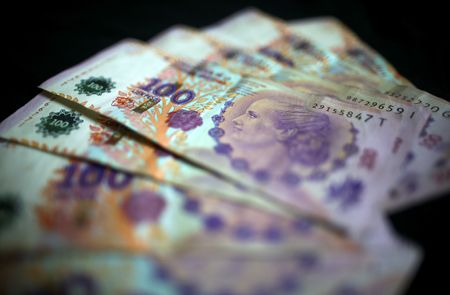 1
1 1
1

By Walter Bianchi and Jorgelina do Rosario
BUENOS AIRES (Reuters) -Argentina will buy back overseas bonds equivalent to over $1 billion to improve the South American country’s debt profile, economy minister Sergio Massa said on Wednesday, looking to send a positive signal to markets despite low reserves levels.
The move will focus on sovereign notes maturing in 2029 and 2030, the minister added, with the program set to start immediately as the country looks to take advantage of a “window of opportunity” after a debt risk index recently fell.
The unusual move, which Massa said could help boost the country’s access to capital markets, comes as Argentina battles to replenish foreign currency reserves, rein in rampant inflation and prop up a weakening local peso currency.
“This is a first step,” Massa said, adding that the government was targeting short-maturity bonds after an over 1,000 basis point drop in a closely watched country risk index since a peak in the middle of last year.
The 2030 bond jumped 7.1% to 35.69 cents on the dollar at 11:15 am local time, a trader told Reuters.
“Undoubtedly over the next few months, by inviting the private sector to accompany the Argentine state in this job of improving its (debt) profile, we will carry out other measures like the one we are taking today,” he added.
Argentina’s sovereign bonds languish in distressed territory despite major debt restructurings in 2020 with private creditors and a $44 billion re-profiling on a failed program with the International Monetary Fund (IMF).
An IMF spokesperson didn’t reply to a request for comment on the country’s debt buy back announcement.
Walter Stoepplewerth, chief strategist at Gletir Corredor de Bolsa, said part of the aim of the move was to narrow a large gap between the official peso-dollar exchange rate and popular parallel currency markets, where dollars are twice as expensive.
“We believe that providing some calm to the parallel dollars is the real goal of this program,” he said, but warned low reserve levels created a challenge. Gross reserves are around $43 billion but net levels are estimated to be far lower.
“The real question here is about Massa’s team firepower. Net reserves are hovering around $6.08 billion, so this first phase program counts for 16.44% of this scarce stock,” he added.
(Reporting by Walter Bianchi and Jorgelina do Rosario; additional reporting by Rodrigo Campos, Writing by Adam Jourdan; Editing by Chizu Nomiyama, Alexandra Hudson)